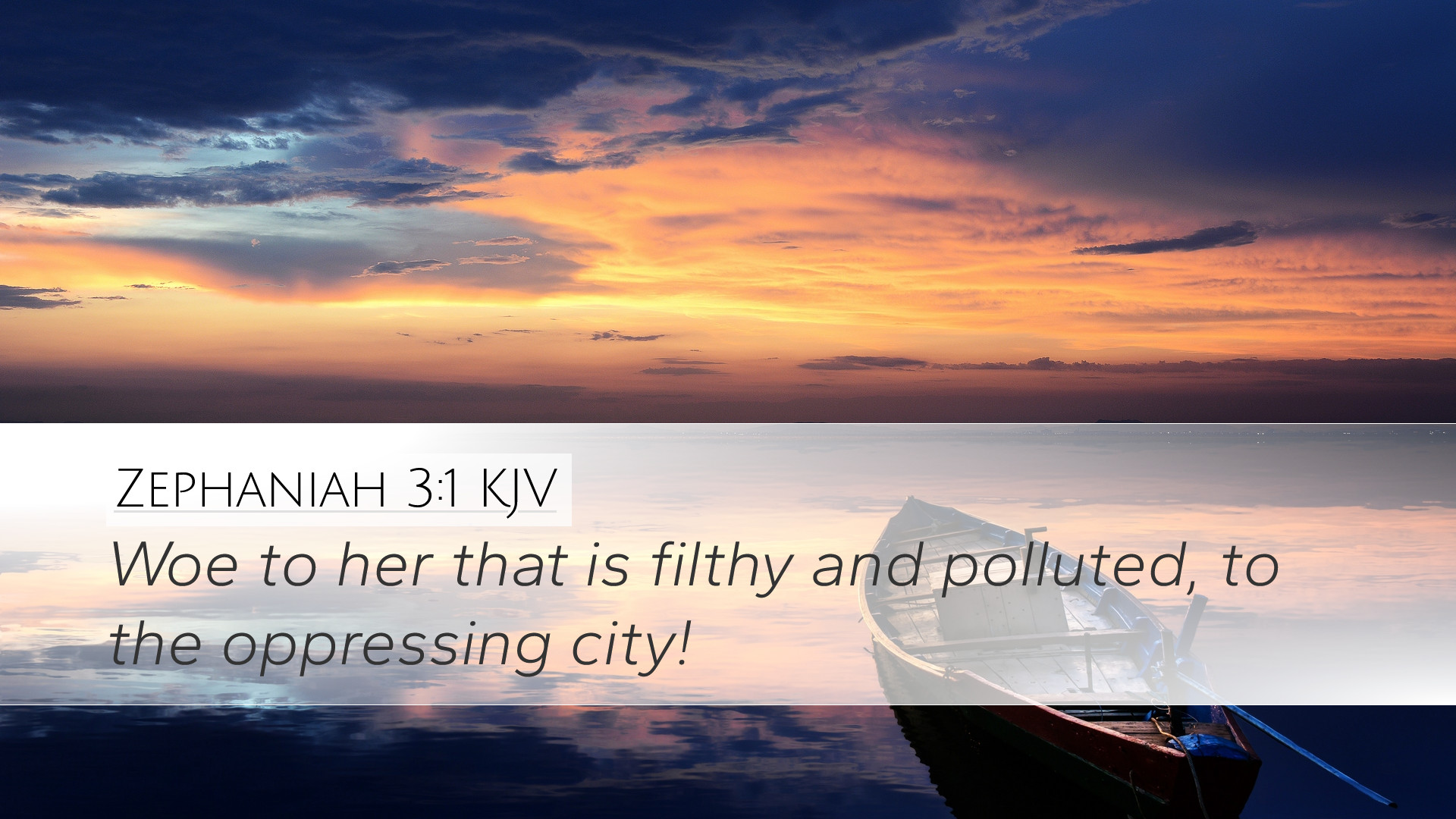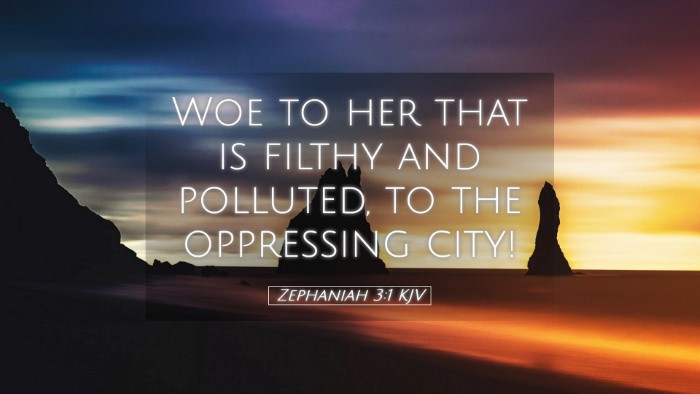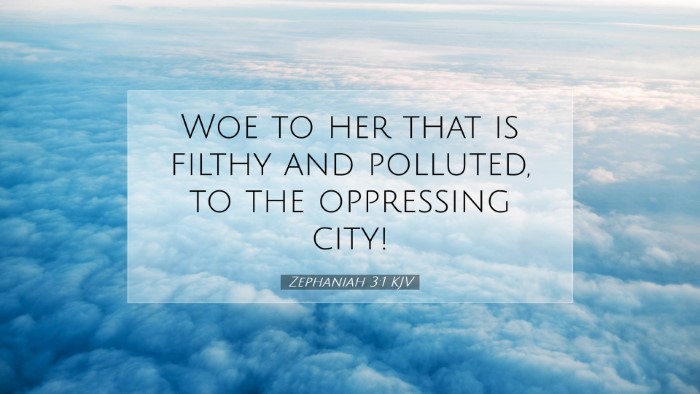Old Testament
Genesis Exodus Leviticus Numbers Deuteronomy Joshua Judges Ruth 1 Samuel 2 Samuel 1 Kings 2 Kings 1 Chronicles 2 Chronicles Ezra Nehemiah Esther Job Psalms Proverbs Ecclesiastes Song of Solomon Isaiah Jeremiah Lamentations Ezekiel Daniel Hosea Joel Amos Obadiah Jonah Micah Nahum Habakkuk Zephaniah Haggai Zechariah MalachiZephaniah 3:1
Zephaniah 3:1 KJV
Woe to her that is filthy and polluted, to the oppressing city!
Zephaniah 3:1 Bible Commentary
Commentary on Zephaniah 3:1
Zephaniah 3:1 states, “Woe to her that is filthy and polluted, to the oppressing city!” This verse presents a profound indictment against the city of Jerusalem, portrayed as a place steeped in rebellion and corruption. In order to understand the depth of this verse, we draw insights from various public domain commentaries, offering a multi-faceted reflection on its implications for both the original audience and contemporary readers.
Contextual Analysis
Firstly, understanding the historical and societal context surrounding the book of Zephaniah is crucial. Zephaniah prophesied during the reign of King Josiah around 640-609 B.C., a time when Judah was riddled with idolatry and moral decay. The northern kingdom had already fallen to Assyrian conquest, and the looming threat of Babylonian violence cast a shadow over Jerusalem.
Matthew Henry's Insight
Matthew Henry notes that the "filthy and polluted" descriptor refers to both moral filthiness and the spiritual corruption that had taken root in Jerusalem. He highlights the idea that the city, once beloved because of God’s presence, had become a den of iniquity. The term "oppressing city" indicates the social injustices and systemic oppression experienced by the vulnerable segments of society. Henry underscores that God has a watchful eye on such transgressions and will not let them go unaddressed.
Albert Barnes' Perspective
In the context of Albert Barnes' commentary, he expounds upon the implications of the word "woe." This expression signifies impending judgment and serves as a call to repentance. Barnes emphasizes that this "woe" is directed toward the city as a collective entity that had turned away from God's commands. He argues that the behavior of Jerusalem reflects broader themes of divine justice and human accountability.
Adam Clarke's Interpretation
Adam Clarke provides a detailed examination of the term "city," linking it to the broader socio-political environment. He interprets "the oppressing city" to symbolize a metropolis that places itself in opposition against God's will. Further, Clarke delves into the specific habits of the people of Jerusalem, such as idolatry or social injustice, suggesting that these practices heavily contributed to their fate. Clarke warns that neglecting God’s statutes creates a societal fabric steeped in spiritual decay.
Thematic Considerations
-
Moral Corruption:
The repeated emphasis on "filthy and polluted" serves as a lamentation over the moral failings of the people. This theme resonates throughout the prophetic literature, underscoring a call toward holiness and separation from sin.
-
Judgment and Woe:
The stark proclamation of "woe" as understood through the commentaries brings out a prophetic warning. This warning not only addresses Jerusalem's sins but extends to any society that mirrors these transgressions.
-
Oppression:
Highlighting the term "oppressing" illuminates the plight of the marginalized. Commentators like Henry and Clarke provide insight into how oppression is not just a political failure but a spiritual one, as it betrays God’s heart for justice and righteousness.
-
Call to Repentance:
This verse serves as a clarion call to recognize one's failings and turn back to God, an essential theme throughout the prophetic texts.
Application for Modern Readers
For pastors and theologians, the dynamic of sin, judgment, and mercy provides a rich tapestry for preaching and teaching. The insights from Henry, Barnes, and Clarke remind contemporary readers that God’s heart desires both justice and mercy. The call to acknowledge moral decay and seek restoration resonates deeply in today’s context, where many societies grapple with similar issues of corruption and injustice.
Students of theology can draw from these commentaries to understand the importance of social ethics as heavily intertwined with spiritual fidelity. The prophetic voice serves as a reminder of the inherent link between a nation's moral standing and its relationship with God.
Conclusion
In Zephaniah 3:1, the lamentation over Jerusalem’s condition resonates through the ages as an indictment of any society that chooses the path of filth and oppression. Through the guidance of public domain commentaries, the modern reader is equipped to reflect on their context, drawn towards a pursuit of holiness, justice, and heartfelt repentance. The prophetic message, although birthed in a historical moment, transcends time, serving as a timeless reminder of God’s justice and love.


